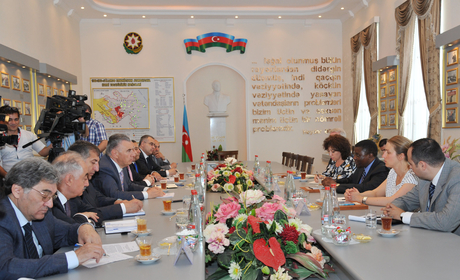ID :
329414
Tue, 05/20/2014 - 14:59
Auther :
Shortlink :
https://oananews.org//node/329414
The shortlink copeid
Azerbaijani Deputy Premier meets UN Special Rapporteur on human rights of IDPs

Baku, May 19 (AzerTAc). Azerbaijani Deputy Prime Minister, Chairman of the State Committee for Refugees and IDP Affairs, head of the Republican Commission on International Humanitarian Aid, Ali Hasanov has today met Special Rapporteur on the human rights of internally displaced persons at the Office of the UN High Commissioner for Human Rights, Chaloka Beyani.
Mr. Hasanov gave an insight into the history and consequences of the Armenia-Azerbaijan Nagorno-Karabakh conflict, and the state of refugees and IDPs in the country.
He noted that as a result of complicated political processes in the South Caucasus region, Azerbaijanis had underwent a policy of forced migration, ethnic cleansing and deportation several times in the last 200 years.
“Mass resettlement of the Armenians living in neighboring countries in Azerbaijan, particularly in the Nagorno-Karabakh started in the beginning of the 19th century as a result of the systematic policy of the Tsarist Russia, which occupied Caucasus.”
Mr. Hasanov noted that 20 per cent of Azerbaijani lands, including Nagorno-Karabakh region and seven adjacent districts, were occupied and over 1 million Azerbaijanis became refugees and IDPs.
“The country’s national and cultural legacy and the whole infrastructure was destroyed as a result of the military aggression of the Armenian Armed Forces against Azerbaijan,” said the Deputy Premier.
Mr. Hasanov said the UN Security Council adopted four resolutions demanding the liberation of the occupied territories of Azerbaijan, and the return of IDPs and refugees to their homes.
“Armenia’s aggression policy has also been condemned in the resolutions and documents of the OSCE, PACE, OIC and other international organizations.”
He expressed regret over the fact that those resolutions “still remain unfulfilled”.
Mr. Hasanov noted the OSCE Minsk Group had been mediating the peace talks for over 20 years, but “there have been no results”.
“Over these years the economic situation in Armenia has worsened, and the population started to leave the country, and the aggressor has remained isolated from all regional projects implemented with Azerbaijan`s involvement.”
Saying that official Baku is interested in fair settlement of the conflict through peaceful means, Mr. Hasanov noted the Azerbaijani government had carried out great work in the legal as well as socio-economic fields in order to meet the needs of refugees and internally displaced persons.
The Deputy Premier said the Azerbaijani government had spent $5.4 billion to tackle problems of refugees and IDPs in the last 20 years.
He noted that 82 modern towns with state-of-the-art social and technical infrastructure had been built for refugees and IDPs, describing this as “a strong signal of the President’s attention to their problems”.
Mr. Hasanov said that the housing conditions of over 180,000 refugees and IDPs had been improved through the funds of the State Oil Fund.
He noted that humanitarian programs had also been carried out for IDPs.
“In 2003 the poverty rate was 49 percent in the country, and 75 percent among refugees and internally displaced persons.”
“As a result of the measures taken by the government the poverty rate has been reduced to 5 percent in the country and to 15 percent among refugees and internally displaced persons.”
Mr. Beyani touched upon the four UN Security Council resolutions on the Nagorno-Karabakh dispute. He said that he could raise the issue at the UN Security Council.





